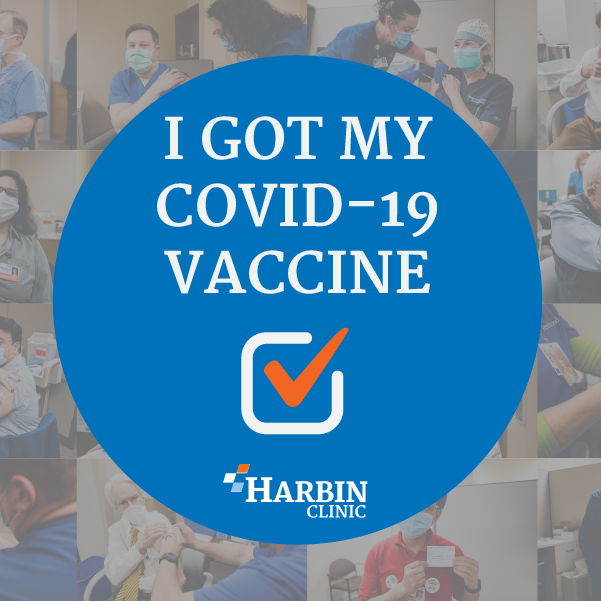Debunking COVID Vaccine Myths

There is a multitude of questions, speculations, and myths circulating regarding the COVID-19 vaccine, and it can be difficult to know which sources to trust. Depending on the source, some information is accurate while others provide misinformation or even make false claims. Before considering vaccine information from any source on the internet, make sure that it comes from a credible source and is updated on a regular basis.
We want to provide our employees, patients, and the community with accurate and reliable information about the COVID-19 vaccine. We spoke with Infectious Disease physician Dr. John Hostetler to debunk some common myths. If you have further questions, schedule an appointment with your doctor to discuss your concerns or submit the question in the form below. Together, we can ensure our communities stay healthy and safe in the fight against COVID-19.
MYTH: The COVID-19 vaccine development was rushed, so I can’t trust its effectiveness or safety.
Fact: Four critical factors led to the unprecedented speed at which these COVID-19 mRNA (messenger RNA) vaccines were approved for use by the FDA.
First, mRNA technology had been in development since the mid-2000s. There were 12 early phase clinical trials in progress or completed by October 2019 for such things as Ebola, Rabies, and influenza. No long-term safety concerns emerged from these studies.
Second, mRNA vaccines do not utilize live viruses, so they can be manufactured quickly in large quantities in a cell-free process that does not involve preservatives or materials of animal origin.
Third, once the candidate vaccines were shown to be safe and dosing optimized for the best immune response, the U.S. government provided the financial backing to conduct large-scale clinical trials with both vaccines in July of 2020. Many volunteers (approximately 70,000) quickly stepped up to participate in these seminal trials. In terms of the size and safety oversight, these studies were at least equal to or exceeded the same FDA standards applied to all other vaccines in common use today.
Fourth, because COVID-19 was so common when these studies were launched in 2020, it did not take long to quickly show a difference in the incidence of infection between those who received the vaccine and those who did not. Needless to say, those who received the vaccine had far fewer infections, and the infections that did occur were not life-threatening. The safety of these vaccines was also quite apparent with only rare severe adverse reactions.
Based upon the preponderance of evidence from these early clinical trials, the FDA determined the vaccines to be both safe and effective. As such, the FDA issued emergency use authorization for several vaccines even as controlled clinical trials were being completed. As a result, we now have in effect post-marketing data from the widespread utilization of COVID19 vaccines in addition to the evidence coming from the controlled clinical trials.
The number of people who have received at least one COVID-19 vaccine is in the 100’s of millions. Over 200 million in the US alone. The CDC continuously monitors and publishes any significant safety concerns, and these can be found on their website. Manufacturers of the vaccines have applied for formal FDA approval of their respective vaccines with FDA approval anticipated no later than December 2021.
MYTH: The COVID-19 vaccine can affect women’s fertility.
Fact: The COVID-19 vaccine will not affect fertility, and there is currently no evidence that the vaccine causes problems throughout a woman’s pregnancy, including the development of the placenta. Additionally, there is no evidence that any vaccinations (this includes the COVID-19 vaccine) impact fertility.
The COVID-19 vaccine helps the body create copies of the spike protein found on the coronavirus’s surface, which allows the body to fight the virus if exposed. The confusion began when an article circulated on social media earlier this year stating that this spike protein was the same spike protein that is involved in the growth and attachment of the placenta during pregnancy (called syncytin-1). The false article stated that getting the COVID-19 vaccine would cause a woman’s body to fight this spike protein and affect her ability to become pregnant.
These two spike proteins are completely different and getting the COVID-19 vaccine doesn’t impact a woman’s ability to get pregnant, including through in vitro fertilization methods. The American College of Obstetricians and Gynecologists (ACOG) and the Society for Maternal-Fetal Medicine (SMFM) recommend that women who are pregnant, breastfeeding, or planning to become pregnant receive the vaccine. They note that the risk of complications and hospitalization is significantly higher for pregnant women who contract COVID-19.
MYTH: The COVID-19 vaccine will enter my cells and change my DNA.
Fact: The purpose of all vaccines is to stimulate an immune response against organisms that would do us harm. This requires exposing our immune system to key proteins that are crucial in producing this response. Scientists already knew from other deadly coronaviruses (SARS, MERS) that the spike proteins on the surface of this virus hold the key to that response. The messenger RNA (mRNA) from the Moderna and Pfizer vaccines do enter the cell but not the nucleus of the cell where DNA resides. The mRNA teaches a few of our cells to produce this spike protein to stimulate an immune response. Once that protein is made, the mRNA, along with the other stabilizing components of the vaccine, are cleared from our body leaving us only with a defense system to counter future attacks from this virus. Learn more about mRNA and viral vector vaccines by visiting the CDC website.
MYTH: I’ve already had COVID-19, so I don’t need the vaccine.
Fact: Those who have gotten sick with COVID-19 can still benefit from getting the vaccine. Due to the severe health risks associated with a COVID-19 infection, and the fact that re-infection is a possibility, it’s recommended that those who have previously had COVID-19 still get the vaccine. According to recent reports, COVID-19 infection does result in some natural immunity from the virus, but the duration and efficacy are still being studied. There is reason to believe, however, that immunity from the vaccine may result in more durable protection because, at least in part, antibody levels achieved with vaccination are more consistent and often of greater magnitude than natural infection.
MYTH: Getting the COVID-19 vaccine can make me sick with COVID-19.
Fact: None of the authorized COVID-19 vaccines in the United States contain the live virus that causes COVID-19. This means, that you cannot get sick with COVID-19 from the vaccine. The COVID-19 vaccines currently in use teach our bodies to recognize the virus and create an immune response in order to fight it. You can learn more about mRNA and viral vector vaccines by visiting the CDC website. For many, this process can cause the body to experience symptoms such as sore arm, fatigue, muscle aches, headaches, and fever. These can be taken as signs of a strong immune response to the vaccine and should not be worrisome that there will be long-term effects or signs of the COVID-19 infection.
The CDC states that it typically takes a few weeks for the body to build immunity after vaccination. That means it’s possible a person could be infected with the virus that causes COVID-19 just before or after vaccination and still gets sick. This is because the vaccine has not had enough time to fully build an immune response and provide protection.
If you have severe allergies, discuss getting the COVID-19 vaccine with your doctor. They can provide more information about if and how you can get vaccinated safely.
MYTH: If I’m near someone who received a COVID-19 vaccine, my menstrual cycle can be affected.
Fact: Your menstrual cycle cannot be impacted by being near someone who received a COVID-19 vaccine. We know that many things can affect a woman’s menstrual cycle, including stress, changes in schedule, problems with sleep, changes in diet and exercise, and illnesses and infections. If you experience severe or long-term changes with your menstrual cycle, contact your women’s health physician.
If you have questions or concerns about the COVID vaccine, discuss them with your doctor. You can schedule your vaccine appointment by visiting the Georgia DPH website.


